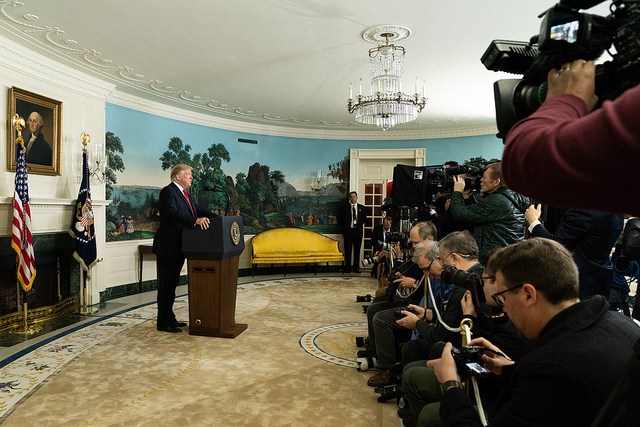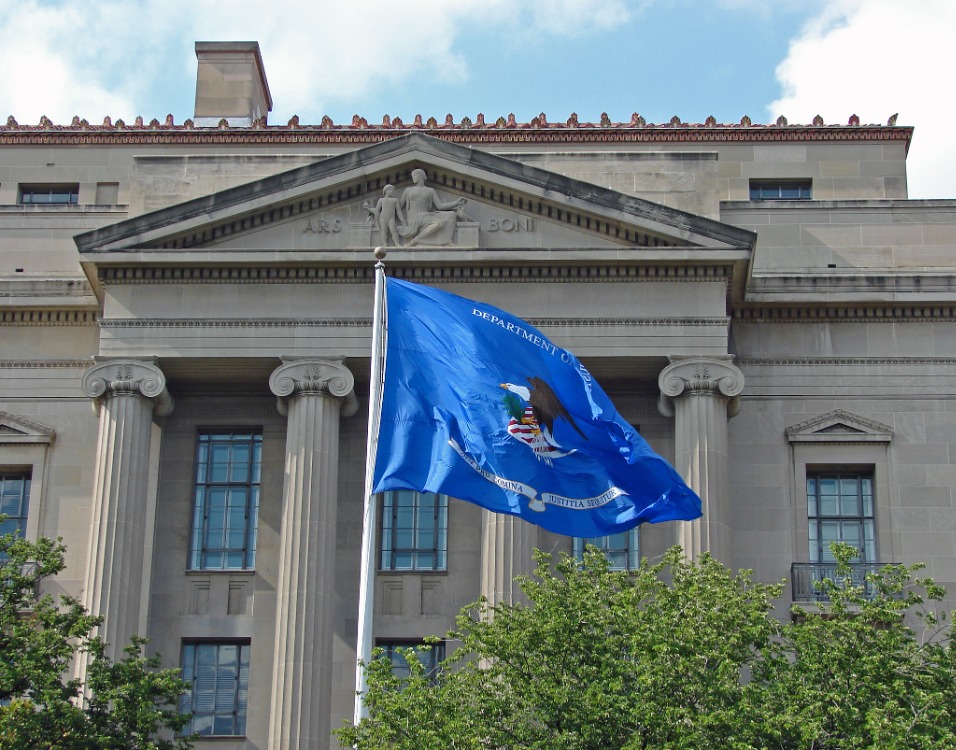The National Emergency and the President’s Lawyers
Congress and the courts will soon have the opportunity to respond to Donald Trump’s declaration that Congress’s failure to fund his wall at the level he demanded has resulted in a “national emergency” at the southern border. I and others have written about the weakness of the legal basis for this declaration.

Published by The Lawfare Institute
in Cooperation With

Congress and the courts will soon have the opportunity to respond to Donald Trump’s declaration that Congress’s failure to fund his wall at the level he demanded has resulted in a “national emergency” at the southern border. I and others have written about the weakness of the legal basis for this declaration. Unlike some others, such as Steve Vladeck, I believe that the courts in this instance may well address head-on the question of whether there is a national emergency, rather than skipping that step and turning right away to the statutory authorities that a lawful declaration may allow a president to tap. But in the days ahead, these legal arguments will take place in the light of other institutional behaviors that cannot fail to influence the judicial response.
Of particular interest and significance is the legal advice the president received, or did not receive, from his White House Counsel Pat Cipollone. The leadership of the House Committee on the Judiciary is now pressing for documents and testimony on the administration’s “substantive rationale and legal justification,” and it has asked for Cipollone’s personal testimony.
News reports have indicated that Cipollone warned the president of a “high litigation risk” if Trump declared a national emergency. His office apparently issued “repeated warnings” and was both “frustrated” and “skeptical of the commander in chief’s rationale.” Cipolline reportedly expressed his concern on a remarkable telephone call with the president and Senate Majority Leader Mitch McConnell. The New York Times reports:
...During his final call with Mr. Trump, [McConnell] looped in the White House counsel, Pat Cipollone, who expressed misgivings about the emergency declaration, telling an annoyed Mr. Trump that it would prompt several serious lawsuits.
Mr. McConnell, quickly shifting from opposing the declaration to managing its rollout, snapped back, “Who cares? This is America — everybody sues everybody else,” according to a person the leader spoke to late Thursday.
One could read this episode several ways, but certainly the most reasonable interpretation is that neither the president nor the majority leader “cared” about the constitutional and legal authority for the declaration. The president wished to save face when Congress presented him with a resolution that allocated roughly 20 percent of the amount he wanted. The Republican leadership wanted to avoid another shutdown. So it is not surprising that the lawyers were “frustrated,” having expressed constitutional and legal reservations that the president and McConnell cast aside.
Nowhere in the press reports is there clear indication of the role of the Office of Legal Counsel (OLC), which normally advises the president on delegated authority from the attorney general on major questions of executive authority. In one fairly standard view, OLC is the primary source of substantive legal analysis and the White House counsel acts on behalf of the president in seeking and coordinating the delivery of this advice. Nothing prevents the president’s lawyer from discussing with OLC the framing of the issues or expressing views on the law or its application to particular facts. But, in this structure, OLC plays the decisive role as the president’s legal adviser on the merits of the legal options.
Of course, the president makes a final call on legal matters, and he is not bound to request OLC’s opinion or—if it is requested—to follow its advice. OLC might be brought into the discussion, left out entirely or relegated the largely pro forma role of reviewing the final executive order for “form and legality.” One Washington Post report describes OLC as conducting the “form and legality” review and “ultimately” giving its “blessing.” This suggests a limited role, and, even within those limits, the reference to a blessing “ultimately” given is intriguing. How long might OLC have held out in sharing and communicating the White House counsel’s doubts about the legality of the course that the president was insisting on pursuing?
The president is certainly free to assign to the White House counsel the primary responsibility for exploring and recommending legal options. There is even a case to be made for the choice of this process in instances of a genuine national security crisis. However, in the case of Trump’s desire to construct a wall, there is little support for the claim that the situation at the border has reached “crisis” dimensions—setting aside the further question of whether any crisis at the border touches on American national security.
It seems clear from the reporting that the White House counsel did run the legal show: It was to Cipollone that the president looked, if to anyone, for legal guidance. This is not what was distinctive about the structure of the legal advisory process in this instance. More striking is the outcome: On a constitutional and legal issue of this magnitude, it appears that the president did not receive the advice he wanted but just went ahead and did what he had wanted to do from the beginning.
It is true that a president can decide to act on his own reading of his constitutional and legal authorities, or simply elect to disregard the law and ride out the political consequences (or reap what he imagines will be the political advantage). But to anoint the White House counsel as his legal adviser for these purposes, and then to brush aside the counsel’s advice, speaks volumes about the president’s legal position in the challenges ahead. It cuts strongly against Trump’s insistence at his Feb. 15 press conference that the declaration was not a political stunt to fulfill a campaign commitment to “build the wall.”
If Trump has exercised his own judgment about what the law authorizes—if, according to the reporting, he had his own “rationale”—then what he has had to say about his reasoning becomes that much more important to his case. From that perspective, his press conference announcing the declaration of emergency was a catastrophe. He acknowledged that Congress had given money for the wall, but “not so much.” Congress had “skimped,” and he is “not happy about it.” He also claimed that his administration was doing just fine without emergency powers, an “incredible” job in fact, and those successes include building and renovating walls, and keeping “thousands” of gang members out of the country. He just wants to do more “faster,” and he should be able to do as other presidents have done: sign an emergency declaration and “nobody cares.” He also predicted he would likely lose lawsuits until the matter reached the Supreme Court.
No wonder his counsel has doubts about this declaration’s legal prospects.
But the public still does not have all the facts about the way that the legal advisory process was set up, and the specifics of what the White House counsel advised the president. On the question of exercise of emergency presidential powers, this information is especially important. The House is moving to obtain it, and there is precedent in exceptional cases for Congress to request that the president waive executive privilege to allow the White House counsel to give an accounting of the legal advisory function. One such case was President Clinton’s waiver to allow the testimony of senior White House aides, including his White House counsel, on the pardon of fugitive Marc Rich.
Donald Trump would surely refuse to waive the privilege. From all available clues, it seems highly likely that the White House counsel’s testimony would severely damage the president’s legal position in the litigation that Trump rightly anticipates. Still, in making the request and compelling the president to reject it, the House will have made its point—and it’s a point worth making.




